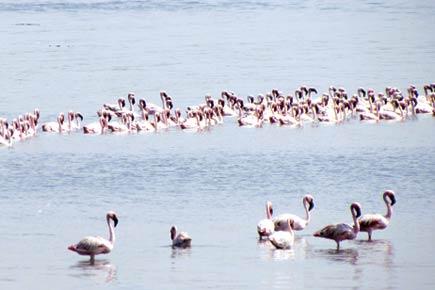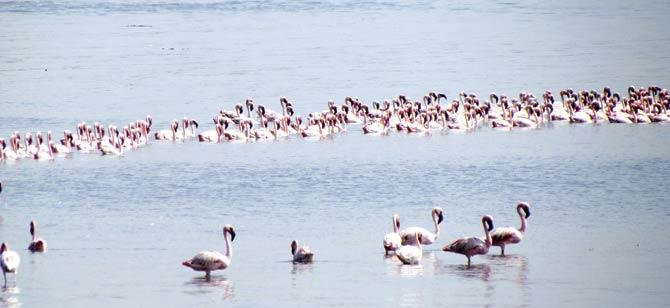The winter is my favourite season in Mumbai since it brings in hundreds of migratory birds from all over the world to enliven this otherwise grey city

 The winter is my favourite season in Mumbai since it brings in hundreds of migratory birds from all over the world to enliven this otherwise grey city. There are the golden orioles, Indian rollers, hoopoes, a wide variety of wagtails and flycatchers that brighten our gardens and streams. Then of course, there are massive eagles that hang around the Parsik Hills in Thane and the salt pans of Vasai. And with a nearly 150 km coastline, the city hosts sandpipers, terns, gulls and plovers that forage along our sandy, rocky and muddy bays, looking for crabs and fish. But the birds that strike a chord and bring a smile on the face of non-bird enthusiasts too, are flamingos.
The winter is my favourite season in Mumbai since it brings in hundreds of migratory birds from all over the world to enliven this otherwise grey city. There are the golden orioles, Indian rollers, hoopoes, a wide variety of wagtails and flycatchers that brighten our gardens and streams. Then of course, there are massive eagles that hang around the Parsik Hills in Thane and the salt pans of Vasai. And with a nearly 150 km coastline, the city hosts sandpipers, terns, gulls and plovers that forage along our sandy, rocky and muddy bays, looking for crabs and fish. But the birds that strike a chord and bring a smile on the face of non-bird enthusiasts too, are flamingos.
ADVERTISEMENT

Salt pans, creeks and mangroves around Mumbai are important habitats for flamingoes
A few days ago, my friend Arpit Parekh sent me an image of a group of 40 flamingos he had clicked on his cell phone, while travelling on train from Nallasopara to Vasai. Not only did it perk me up, it also established the importance of salt pans, creeks and mangroves around Mumbai as important habitats for flamingos and other resident water birds.
The recent declaration of the Airoli region as Thane Bird Sanctuary in a bid to protect the winter home of flamingos is an important step in the right direction. However, Greater and Lesser flamingos have been known to occupy the creeks around Mumbai, Thane, Navi Mumbai and Uran.
It isn't an uncommon sight to find a dozen or two of them in the brackish waters of the Mithi River right behind the Maharashtra Nature Park, in Dharavi. But if you visit the Sewri-Mahul wetlands during low tide on a winter morning, you will be blown away by a sea of dazzling pink. Almost 15,000 or more Lesser and Greater flamingos gather here, sometimes, even numbering 40,000. Most Mumbaikars must've read newspaper reports about their arrival and some may have attended Wader Watch programmes organised by leading NGOs. However, very few realise that the avian beauties throng alkaline mudflats to feast on algae and crustaceans, which result in their deep pink colour. This diet and resultant colour has earned them the title, Wings of Fire, which is also the etymology of their Latin name Phoenicopterus.
Flamingos are specialist filter feeders, with odd, upside down beaks, which they sway side-to-side while hanging their long necks low in the marshes. Their tall legs and long necks allow them to wade through the high waters of rising tides. In fact, they also do an interesting dance-like walk with raised heads, huddled in a tight group. Their run up on the water before take-off and synchronised flights are a photographer's delight.
Although there are six species globally, only two are found along Indian coasts. Flamingo City in the Greater Rann of Kutch is famed for being the only nesting colony of the Greater flamingos in India. Further northwards in the Rann are the only breeding colonies of lesser flamingos, outside of Africa. There are a few natural predators that threaten the flamingos but their habit of laying a single egg makes them slow breeders.
Unfortunately, recent changes in national conservation priorities have resulted in a threat to both, their winter and summer habitat. While a major road widening operation has endangered the breeding colony in Kutch; an ill-conceived Trans-Harbour Link road is being designed to pass through the heart of the Serwi Flamingo bay in Mumbai. If constructed, the pillars of this stilted road will permanently destroy the crucial wintering grounds of the Greater and Lesser flamingos, along with over 70 species of birds, some of which travel over 5,000 km to reach Mumbai's creeks.
To money-minded Mumbaikars, they may seem like a bunch of pretty pink feathers, with little economic significance. But they signify the ecological resilience of the city and the resolve to stake claim to what historically is rightfully theirs — the isles of Mumbai.
Write in to Anand at sproutsonline@gmail.com
 Subscribe today by clicking the link and stay updated with the latest news!" Click here!
Subscribe today by clicking the link and stay updated with the latest news!" Click here!






